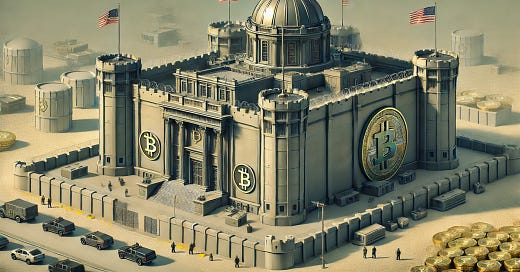President Donald Trump surprised political observers and crypto enthusiasts alike last weekend by announcing plans to establish a U.S. Strategic Crypto Reserve that would include Bitcoin and several other major cryptocurrencies. What exactly does that mean, and could it reshape America's financial future?
To start with the basics, Bitcoin is digital money that exists entirely online, secured by complex codes that even advanced computers (probably) won’t be able to crack within our lifetimes. Unlike traditional money issued by governments, Bitcoin operates on a decentralized network. No single authority controls it, and transactions are recorded transparently on a digital ledger known as the blockchain. Many bitcoin proponents think of it as ‘digital gold’: scarce, secure, and increasingly valued as a store of value and a potential hedge against inflation.
Trump's idea is modeled on existing U.S. reserves, like the Strategic Petroleum Reserve (SPR) for oil and the gold reserves held at Fort Knox. These reserves exist to ensure the nation's economic stability during emergencies or market turmoil. Supporters of a cryptocurrency reserve argue it would similarly serve as an asset held by the government, diversifying America's holdings and positioning the U.S. to benefit if Bitcoin’s value continues to rise.
Trump envisions buying significant amounts of crypto over time, beginning with Bitcoin currently held by the U.S. government from law enforcement seizures. Of course, not everyone is on board with this unorthodox move.
Some critics argue Bitcoin is too volatile and risky for a government reserve. Others fear it could enrich a few private investors, complicate regulatory oversight, or essentially create a rival currency that could weaken the power of the dollar. Even some supporters of crypto believe more government involvement goes against the libertarian spirit of Bitcoin.
Still, Trump's crypto-friendly stance represents a major policy shift and positions the U.S. in stark contrast to some cautious international partners, particularly in Europe.
Interestingly, America wouldn’t be the first country to build a crypto stockpile. El Salvador began accumulating Bitcoin reserves in 2021 and currently holds nearly 6,000 bitcoins worth hundreds of millions of dollars – though, last month the government stopped accepting Bitcoin as legal tender. As of December 2024, the profit gain from El Salvador’s reserve totaled roughly $300 million.
Here's how Trump's crypto reserve would stack up to some other assets the U.S. keeps in reserve:
(Note: Estimated values fluctuate based on market conditions.)
The Bitcoin reserve would be unique – it would exist entirely digitally, requiring unprecedented cybersecurity measures, and could rapidly increase or decrease in value. The total global crypto market cap ten years ago was $4 billion. Today, it is an eye-watering $3 trillion. And as the cryptocurrency market has grown, so has the political engagement of its leading advocates – the cryptocurrency industry spent $133 million on pro-crypto PACs during the 2024 election cycle.
Whether you think it's visionary or risky, the U.S. could be on the cusp of radically reshaping the perception and adoption of cryptocurrency around the world.




